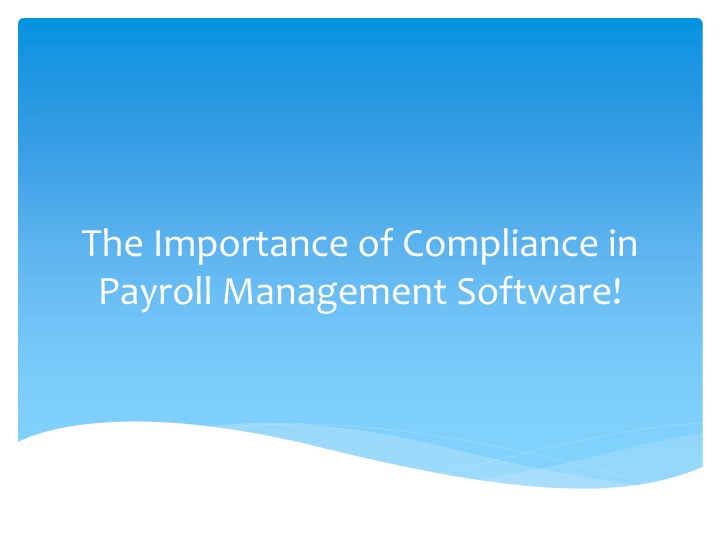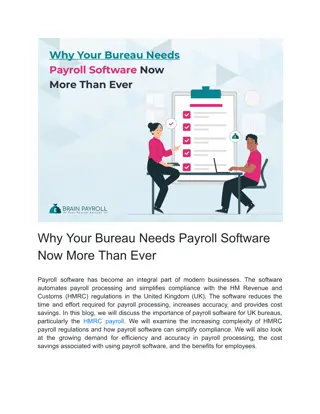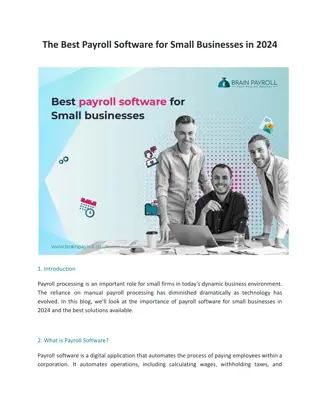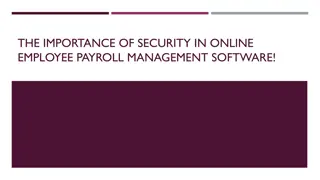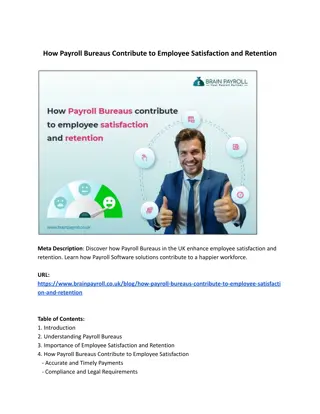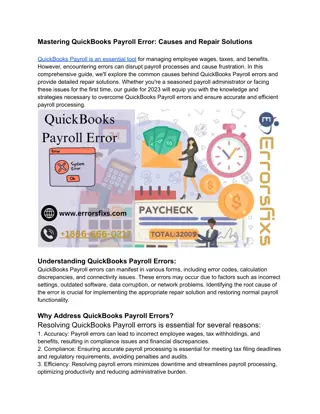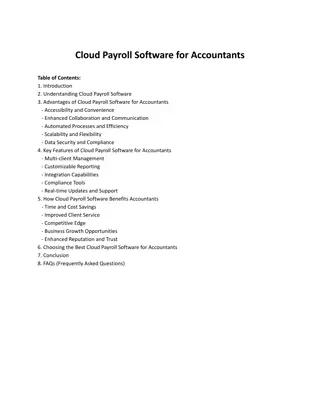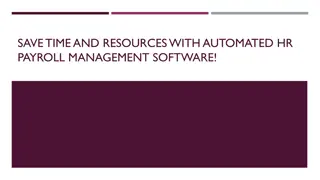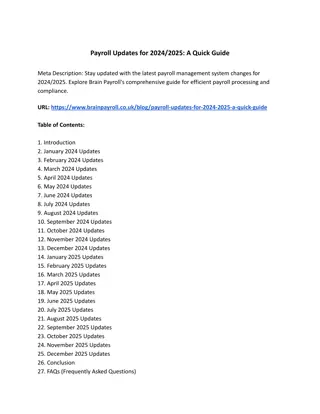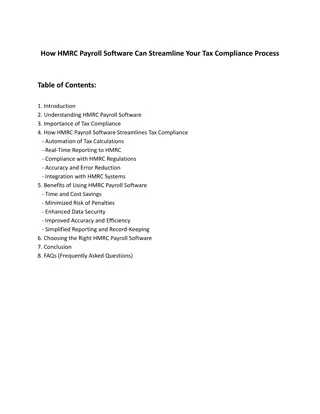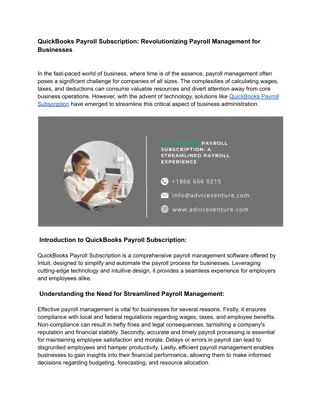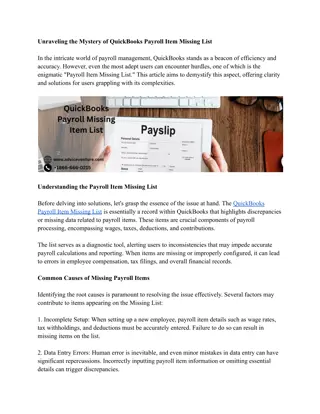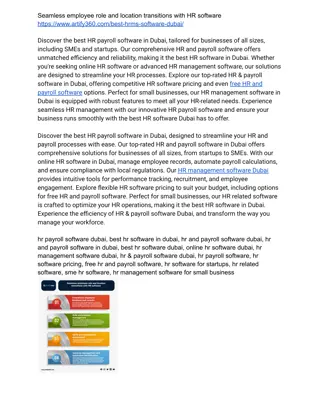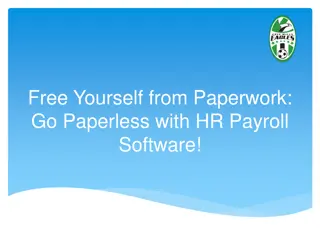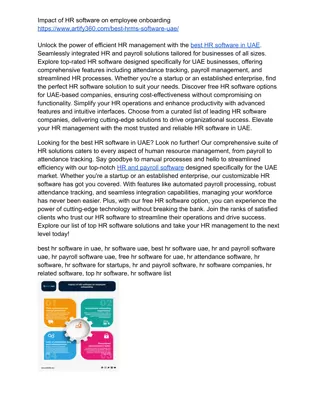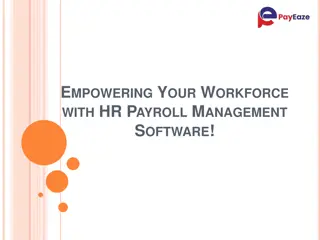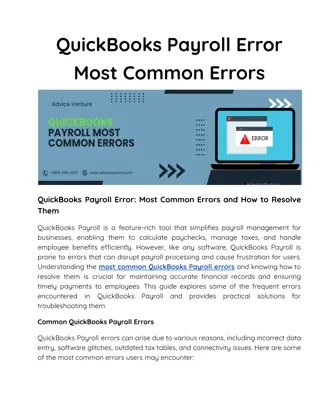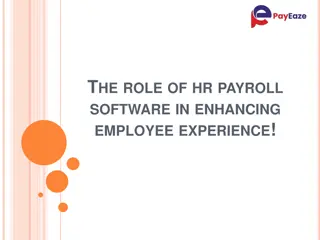The Crucial Role of Compliance in Payroll Management Software!
Payroll management software is essential for businesses of all sizes, automating processes like wage calculation and tax deduction. Compliance ensures adherence to legal frameworks, safeguarding against penalties and fostering trust. Key features include robust security measures, tax compliance capabilities, and detailed reporting. Choosing compliant software is vital, considering factors like industry-specific features and scalability. In a dynamic regulatory landscape, compliance remains paramount for accurate and efficient payroll processing, bolstering organizational integrity and employee
Download Presentation

Please find below an Image/Link to download the presentation.
The content on the website is provided AS IS for your information and personal use only. It may not be sold, licensed, or shared on other websites without obtaining consent from the author.If you encounter any issues during the download, it is possible that the publisher has removed the file from their server.
You are allowed to download the files provided on this website for personal or commercial use, subject to the condition that they are used lawfully. All files are the property of their respective owners.
The content on the website is provided AS IS for your information and personal use only. It may not be sold, licensed, or shared on other websites without obtaining consent from the author.
E N D
Presentation Transcript
The Importance of Compliance in Payroll Management Software!
Payroll management is a critical aspect of running a business, and with the advent of technology, HR Payroll Management Software has become an essential tool for organizations of all sizes. However, in the realm of payroll management, compliance is paramount. This article explores the significance of compliance in payroll software and why businesses cannot afford to overlook it
Understanding Payroll Management Software What is Payroll Management Software? Payroll software is a digital solution designed to streamline and automate the process of paying employees. It handles tasks such as calculating wages, deducting taxes, and distributing payments. Why is it important for businesses? Payroll software simplifies complex payroll processes, reduces errors, and saves time and resources for businesses. It ensures accuracy and compliance with tax laws and regulations.
Compliance in Payroll Software Definition of compliance Compliance refers to the adherence to laws, regulations, and industry standards. In the context of payroll software, compliance involves following tax laws, labor regulations, and data protection requirements. Importance of compliance in payroll management Compliance ensures that businesses operate within the legal framework, avoiding penalties, fines, and legal issues. It also safeguards employee data and promotes trust and transparency within the organization.
Key Features of Compliant Payroll Management Software Security and data protection measures Compliant payroll software employs robust security measures to protect sensitive employee information from unauthorized access or breaches. Tax compliance capabilities It stays updated with tax laws and regulations, automatically calculating taxes and deductions to ensure accurate payroll processing. Reporting and audit trails Compliant software generates detailed reports and audit trails, enabling businesses to track payroll activities and demonstrate compline to regulatory authorities.
Benefits of Compliant Payroll Management Software Avoidance of penalties and fines By ensuring compliance with tax laws and regulations, businesses can avoid costly penalties and fines, preserving their financial resources. Accuracy and efficiency in payroll processing Compliant software minimizes errors in payroll calculations, leading to accurate and timely payments to employees. Employee satisfaction and trust When employees receive accurate and timely payments, it fosters trust and confidence in the organization, enhancing employee satisfaction and morale.
Challenges in Ensuring Compliance Changing regulations and laws The landscape of tax and labor regulations is constantly evolving, posing challenges for businesses to stay compliant with the latest requirements. Complexity of payroll processes Payroll management involves various complexities, such as multiple tax jurisdictions and benefit plans, making compliance a challenging task for businesses.
Tips for Choosing Compliant Payroll Management Software Research and compare options Before selecting payroll software, businesses should thoroughly research and compare available options to ensure they meet their compliance needs. Look for industry-specific features Different industries may have unique compliance requirements, so businesses should choose software that offers industry-specific features and functionalities. Consider scalability and integration As businesses grow, their payroll needs may change, so it's essential to choose software that is scalable and integrates seamlessly with other business systems.
Conclusion In conclusion, compliance is a critical aspect of payroll software that businesses cannot afford to ignore. By choosing compliant software, organizations can ensure accuracy, efficiency, and trust in their payroll processes while avoiding costly penalties and legal issues. Blog Source - PayEaze
